Indian poetry and Indian literature in general, has a long history dating back to Vedic times. They were written in various Indian languages such as Vedic Sanskrit, Classical Sanskrit, Ancient Meitei, Modern Meitei, Telugu, Tamil, Odia, Maithili, Kannada, Bengali, Assamese, Hindi, Marathi and Urdu among other prominent languages. Poetry in foreign languages such as English also has a strong influence on Indian poetry. The poetry reflects diverse spiritual traditions within India. In particular, many Indian poets have been inspired by mystical experiences. Poetry is the oldest form of literature and has a rich written and oral tradition.

Sankha Ghosh was an Indian poet and literary critic. He was born in Chandpur District of the then Bengal Presidency, present day Bangladesh. His ancestral home was at Banaripara Upazila in Barisal District. He spent his childhood and adolescence in Ishwardi Upazila of Pabna District, which was his father's workplace.
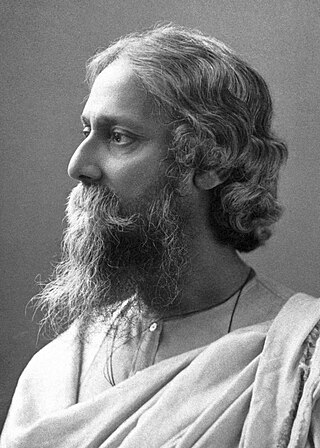
Bengali literature denotes the body of writings in the Bengali language and which covers Old Bengali, Middle- Bengali and Modern Bengali with the changes through the passage of time and dynastic patronization or non-patronization. Bengali has developed over the course of roughly 1,300 years. If the emergence of the Bengali literature supposes to date back to roughly 650 AD, the development of Bengali literature claims to be 1600 years old. The earliest extant work in Bengali literature is the Charyapada, a collection of Buddhist mystic songs in Old Bengali dating back to the 10th and 11th centuries. The timeline of Bengali literature is divided into three periods: ancient (650–1200), medieval (1200–1800) and modern. Medieval Bengali literature consists of various poetic genres, including Hindu religious scriptures, Islamic epics, Vaishnava texts, translations of Arabic, Persian and Sanskrit texts, and secular texts by Muslim poets. Novels were introduced in the mid-19th century. Nobel laureate Rabindranath Tagore is the best known figure of Bengali literature to the world. Kazi Nazrul Islam, notable for his activism and anti-British literature, was described as the Rebel Poet and is now recognised as the National poet of Bangladesh.

Annada Shankar Ray was an Indian poet and essayist in Bengali. He also wrote some Odia poetry.
Rizia Rahman was a Bangladeshi novelist. She had a number of novels and short stories to her credit. Her works cut across all genres. She was best known for the novel Bong Theke Bangla. She was the recipient of Bangla Academy Literary Award (1978). As of 2018, she had published more than 50 novels and short story collections during her long career.
Yashodhara Ray Chaudhuri is a poet residing in Kolkata, West Bengal, India. She produced collections of Bengali poetry. She was awarded the Krittibas Puraskar in 1998 by the Krittibas Patrika.
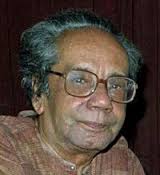
Syed Mustafa Siraj was an eminent Indian writer. In 1994, he received the Sahitya Akademi Award for his novel Aleek Manush, considered his most lauded work. In 2005, his short story "Ranirghater Brittanto" was made into the film Faltu by Anjan Das. He wrote around 150 novels and 300 short stories. He is the creator of the detective character Colonel Niladri Sarkar a.k.a. "Goenda Colonel", the Detective Colonel.

Bishnu Dey was a leading Bengali poet, writer, essayist, academician, art appreciator, and connoisseur in the era of modernism and post-modernism.

Rajesh Joshi is a Hindi writer, poet, journalist and a playwright, who was the recipient of 2002 Sahitya Akademi Award in Hindi for his anthology of poems - 'Do Panktiyon Ke Beech', given by Sahitya Akademi, India's National Academy of Letters. He presently resides in Bhopal and continues to work as a freelance writer. His poems have been translated into English, German, Russian, Urdu and into many other Indian languages. Recipient of Muktibodh Puraskar, Makhan Lal Chaturvedi Puraskar, Srikant Verma Smriti Samman, Shikhar Samman and others.
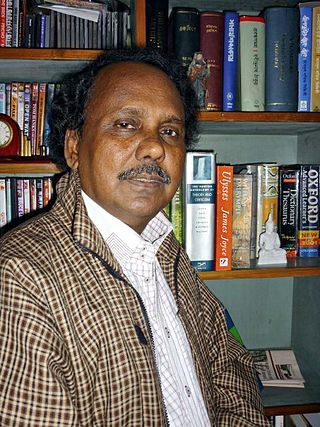
Khondakar Ashraf Hossain was a leading postmodernist poet, essayist, translator, and editor from Bangladesh. He wrote more than eighteen titles.

Bimal Guha is a Bangladeshi poet. He appeared on the Bangladesh literary scene in the 1970s. His themes revolve around the war of liberation and the eternal subjects of love, nature, motherland, mother-tongue, tradition, and modernity.

Sisir Kumar Das (1936–2003) was a linguist, poet, playwright, translator, comparatist and a prolific scholar of Indian literature. He is considered by many as the "doyen of Indian literary historiographers". Almost singlehandedly, Das built an integrated history of Indian literature composed of many languages, a task that had seemed to many important scholars of Indian literature to be “a historian’s despair”. His three volumes A History of Indian Literature is credited for having devised hitherto absent methods necessary for situating diverse Indian literary cultures in history. Apart from this, another monumental work in Das’ scholarly oeuvre is the multi-volume English Writings of Rabindranath Tagore, edited by himself.
Sankari Prasad Basu was an Indian scholar, writer and critic who writes mainly in the Bengali language. He is a researcher on Swami Vivekananda and his books on the subject include Sahashya Vivekananda and Bandhu Vivekananda. One of his notable publications is his seven-volume research work Vivekananda o Samakalin Bharatbarsha, for which he won the prestigious Sahitya Akademi Award in 1978.

Sir Chinmoy Guha is Professor Emeritus at the University of Calcutta, a Bengali essayist and translator, and a scholar of French language and literature. He has served as the Vice-Chancellor of Rabindra Bharati University and Director of Publications, Embassy of France, New Delhi. Earlier he taught English at Vijaygarh Jyotish Ray College in Kolkata for more than two decades, and French at the Alliance Française and the Ramakrishna Mission Institute of Culture for eleven and five years respectively.

Anita Agnihotri is an Indian Bengali writer and poet. Her works have been translated into several major Indian and foreign languages, including English, Swedish and German. She is also a retired civil servant.
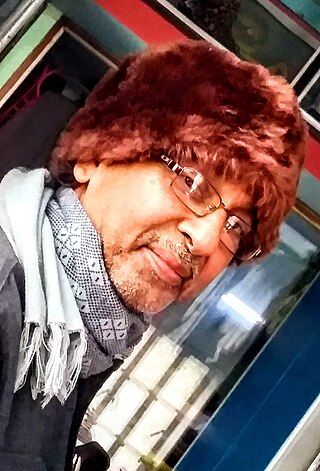
Arup Chandra, born in 1951 in Murshidabad district in the state of West Bengal, is a writer, poet, essayist, art critic, and an educator. He is the writer of more than fourteen books, and has edited twelve others. Two of his books are translated into English and published. His research speciality is the history, poetry, art, culture and literature of Murshidabad District.
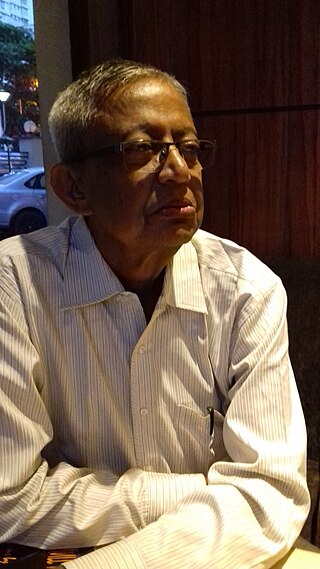
Manohar Mouli Biswas is the pseudonymous appellation adopted by Manohar Biswas, a distinguished and arguably the preeminent bilingual poet, essayist, and luminary figure in Dalit Literature emanating from the Bengal region.

Ramapada Chowdhury was a Bengali-language novelist and short story writer in India. For his novel Bari Badle Jay, he received the Sahitya Akademi Award in 1988. He was also a recipient of the Rabindra Puraskar and several other awards. He won the Rabindranath Tagore Memorial International Prize in its inaugural year. Many of his works have been adapted into films, including the multiple-award-winning Kharij, directed by Mrinal Sen, and Ek Doctor Ki Maut, directed by Tapan Sinha. Chowdhury started writing during the Second World War. He was associated with Anandabazar Patrika for many years, and edited its Sunday supplement. His novels are marked by an economy of expression. He is one of the most well known short story writers in contemporary Bengali literature.
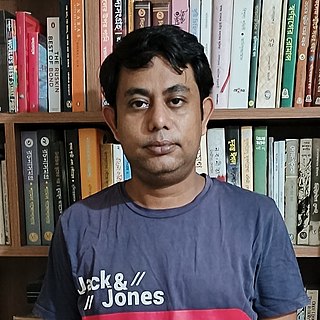
Shamik Ghosh is an Indian author writing in Bengali. He has won the prestigious Sahitya Akademi Yuva Puraskar in 2017 in Bengali for his debut short story collection "Elvis O Amolasundari" His shorty 'Half Timer Pawre' from the collection was selected by Hervill Secker, an imprint of Vintage, Penguin Random House, U.K for the Harvill Secker Young Translators’ Prize 2018. The story was published in Granta online He has been awarded the Ila Chanda Smriti Puraskar by the oldest literary Institution of India, Bangiya Sahitya Parishad. and Somen Chanda Smriti Smarok by West Bengal Bengali Academy in 2019.
Krishna Dhar was an Indian poet, playwright, writer, journalist, columnist and teacher. He wrote poetry alongside verse drama, nonfictional prose of varied nature and journalistic columns from the mid 1940s.